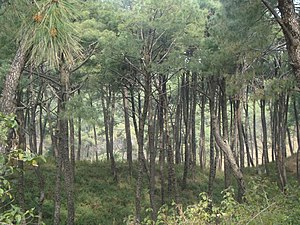Note: This is a project under development. The articles on this wiki are just being initiated and broadly incomplete. You can Help creating new pages.
Pinus roxburghi
Pinus roxburghii is an evergreen tree that can grow up to 55 metres tall. The straight, cylindrical bole can be over 100cm in diameter. In the driest parts of its native range the leaves are shed after 10 - 11 months, making it deciduous. The tree is harvested from the wild for local use as a food, medicine and source of materials. It is an important source of resin and is extensively tapped for this commodity, especially in northwestern India.
Uses
Bladder complaints, Kidney complaints, Rheumatic affections, Respiratory complaints, Coughs, Colds, Influenza.[1]
Parts Used
Chemical Composition
It contains P. roxburghii was identified with major components being (E)-caryophyllene (26.8%), terpinen-4-ol (16.2%), with smaller amounts of δ-3-carene (6.8%) and α-humulene.[2]
Common names
| Language | Common name |
|---|---|
| Kannada | |
| Hindi | |
| Malayalam | |
| Tamil | |
| Telugu | |
| Marathi | |
| Gujarathi | |
| Punjabi | |
| Kashmiri | |
| Sanskrit | |
| English |
Properties
Reference: Dravya - Substance, Rasa - Taste, Guna - Qualities, Veerya - Potency, Vipaka - Post-digesion effect, Karma - Pharmacological activity, Prabhava - Therepeutics.
Dravya
Rasa
Guna
Veerya
Vipaka
Karma
Prabhava
Habit
Identification
Leaf
| Kind | Shape | Feature |
|---|---|---|
Flower
| Type | Size | Color and composition | Stamen | More information |
|---|---|---|---|---|
| {{{5}}} |
Fruit
| Type | Size | Mass | Appearance | Seeds | More information |
|---|---|---|---|---|---|
Other features
List of Ayurvedic medicine in which the herb is used
Where to get the saplings
Mode of Propagation
How to plant/cultivate
Pinus roxburghii is restricted to the monsoon belt with summer rains. It is not a very cold-hardy plant, being able to tolerate short periods with temperatures down to around -5°c when fully dormant.[4]
Commonly seen growing in areas
Photo Gallery
References
- ↑ Indian Medicinal Plants by C.P.Khare
- ↑ Chemical constituents
- ↑ [Morphology]
- ↑ Cultivation
External Links
- Ayurvedic Herbs known to be helpful to treat Bladder complaints
- Ayurvedic Herbs known to be helpful to treat Kidney complaints
- Ayurvedic Herbs known to be helpful to treat Rheumatic affections
- Ayurvedic Herbs known to be helpful to treat Respiratory complaints
- Ayurvedic Herbs known to be helpful to treat Coughs
- Ayurvedic Herbs known to be helpful to treat Colds
- Ayurvedic Herbs known to be helpful to treat Influenza
- Herbs with Seeds used in medicine
- Habit - Evergreen tree
- Index of Plants which can be propagated by Seeds
- Herbs that are commonly seen in the region of Widespread
- Herbs that are commonly seen in the region of Common in north-south oriented valleys
- Herbs





